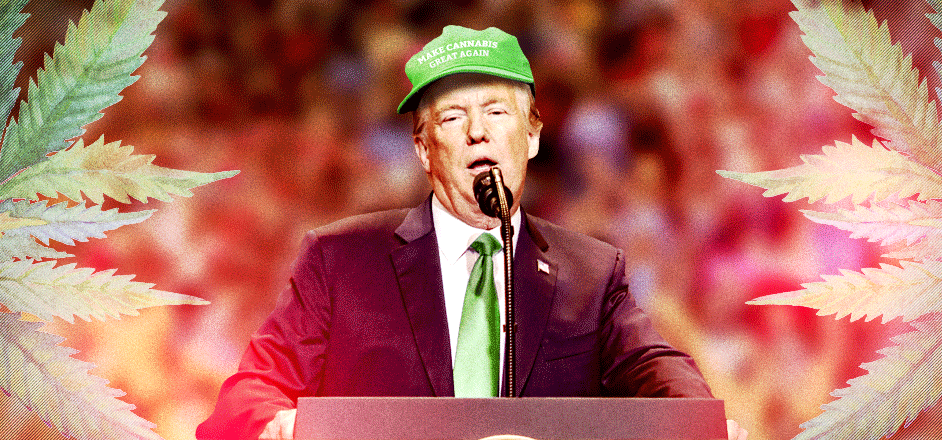It feels like forever ago when President Trump’s first press secretary, Sean Spicer, shakily declared that the White House would go after state-legal cannabis. Two press secretaries and a handful of near-heart-attacks later, and we still haven’t seen the Law-and-Order President deliver. If anything, Trump’s cannabis policy is starting to look a lot like Obama’s.
It wasn’t always this way. Back in February 2017, Spicer said the Trump administration would ramp up “greater enforcement” of federal law in weed-legal states. Less than a year later, Trump’s attorney general, Jeff Sessions, rescinded the Cole memo, an Obama-era set of guidelines that kept state cannabis programs out of the feds’ crosshairs. Without the Cole memo, investors got scared, and weed stocks plummeted.
But stock prices don’t always correlate to economic health. For instance, look at General Motors, which saw a 5 percent increase in stock price just after announcing it would fire 14,000 employees and close four American factories. Ah, the efficiency of capitalism.
Supplying Demand in the Trump Era
First, some numbers. During Trump’s first year in office, cannabis-related arrests did increase nationwide, albeit slightly compared to 2016. Ironically, there were fewer federal raids on grows and dispensaries in Trump’s first year compared to Obama’s last year in office.
Second, some more numbers. Even though more Americans got cuffed over a plant under Trump, business has been booming. In fact, business has never been better.
In Colorado, the first state to legalize cannabis for anyone 21 and over, cannabis sales remained on the steady trajectory established in past years. In 2016, the state sold $1.3 billion worth of weed, making it the first year any state surpassed $1 billion in weed sales. In 2017 – Trump’s first year in office – the Centennial State slung $1.5 billion in weed, a $200-million jump over the previous year under Obama.
Nationwide, cannabis sales followed the same pattern. In 2016, the U.S. sold $6.7 billion worth of cannabis products. A year later, with Trump at the helm, the national industry hocked $9 billion. Not bad, all things considered.
How could this be? Wouldn’t smacking down legal weed be one of the best ways Trump & Company could own the libs?
Not really.
Lighting Up, Lightening Up
Trump may be the Roi de les Trolls, but he’s still a politician. He has a voter base to consider, and conservatives have been warming up to weed. According to a 2017 Gallup poll, 51 percent of Republicans now favor cannabis legalization. Granted, that’s the slightest majority possible. But keep in mind just a decade ago, only a quarter of Republicans wanted legal weed according to this same poll. That’s double the support in just ten measly years.
Then, take into account that 64 percent of all Americans want cannabis legalized for recreational use. If we change the question to medical marijuana only, we find that over 90 percent of all Americans – regardless of political leaning – are now in favor. Trump’s not dumb enough to ignore that data.
And it’s not as if the Don has been coy about his support for sativa. During the 2016 elections, Trump told Bill O’Reilly that he was “in favor of medical marijuana 100 percent.” He’s remained cold, however, toward recreational cannabis, but on that issue, he says he defers to states’ rights.
Can Trump walk this catwalk though? If we believe him (on this one issue, of course), then yes. In June, he told reporters he would likely sign the STATES Act, a bipartisan senate bill that could liberate state-legal weed from federal interference. The U.S. Senate has not yet voted on the act.
GOP dominance of the Senate may mean the STATES Act goes nowhere, especially if the GOP’s stance in the House of Representatives provides us any clues. In the House, members of Trump’s party have killed measures similar to the STATES Act before they could come to a vote.
One of those bill-killing Republicans is Rep. Pete Sessions (no relation to Jefferson Beauregard). Sessions reps Texas – the state with the most restrictive medical marijuana laws in the U.S. – and he axed nearly three dozen cannabis reform bills during his five-year tenure as the chair of the House Rules Committee. These various measures would have eased major obstacles currently blocking the cannabis industry, such as access to banks and creditors.
On Wednesday, Sessions struck again, this time snuffing an amendment that would have allowed tax deductions for state-licensed pot businesses. Currently, cannabis producers and sellers cannot make deductions for common expenditures like employee payroll or transportation, deductions any other industry can make, including the alcohol and tobacco industries.
Pete Sessions and Donald Trump, taken together, perfectly illustrate where the Republican party sits on legalizing cannabis. Neither politician has pushed for sweeping federal reform, nor have they made big moves to clamp down on the industry. They’ve simply allowed it to exist – and flourish – in the grayscale of legal limbo.
Which is a smart move, since if you piss off half of your constituency, you might as well have pissed all of them off.



Leave a Reply